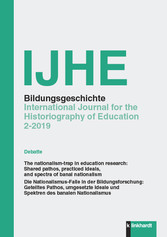Suchen und Finden
Service
IJHE Bildungsgeschichte - International Journal for the Historiography of Education - 9. Jahrgang (2019) Heft 2
Mehr zum Inhalt

IJHE Bildungsgeschichte - International Journal for the Historiography of Education - 9. Jahrgang (2019) Heft 2
Bildungsgeschichte
International Journal for the Historiography of Education 2-2019
Aus dem Inhalt
Beiträge (Rita Hofstetter, Eckhardt Fuchs und Antonella Cagnolati, Gastherausgeber)
– History of education journals and the development of historical research on education in Eastern Europe (1990-2016)
– The processes of internationalization of history of education journals in Brazil (1997-2016)
– Clio’s Presence, or: Where is history of education to be found?
– Global, international and transnational. Reading the trends in Paedagogica Historica, History of Education Quarterly, History of Education and Histoire de l’éducation since 2000
– Global territory and the international map of history of education journals. Profiles and behavior
– Mapping the history of education in a “glocal” world: A study of two academic journals from Brazil and Canada
Debatte
– The nationalism-trap in education research: Shared pathos, practiced ideals, and spectra of banal nationalism
Die Nationalismus-Falle in der Bildungsforschung: Geteiltes Pathos, umgesetzte Ideale und Spektren des banalen Nationalismus
Kolumne
– David F. Labaree: Luck and pluck: Competing accounts of a life in the meritocracy
Vorschau auf 1-2020
“There are two kinds of practices among doctoral students in education that are particularly prominent right now and also particularly problematic for the future health of the field. One practice is the effort to become a hardcore academic technician; the other is the effort to become a hardcore justice warrior. Though at one level they represent opposite orientations toward research, at another level they have in common the urge to serve as social engineers intent of fixing social problem.“ (David F. Labaree)
Alle Preise verstehen sich inklusive der gesetzlichen MwSt.






